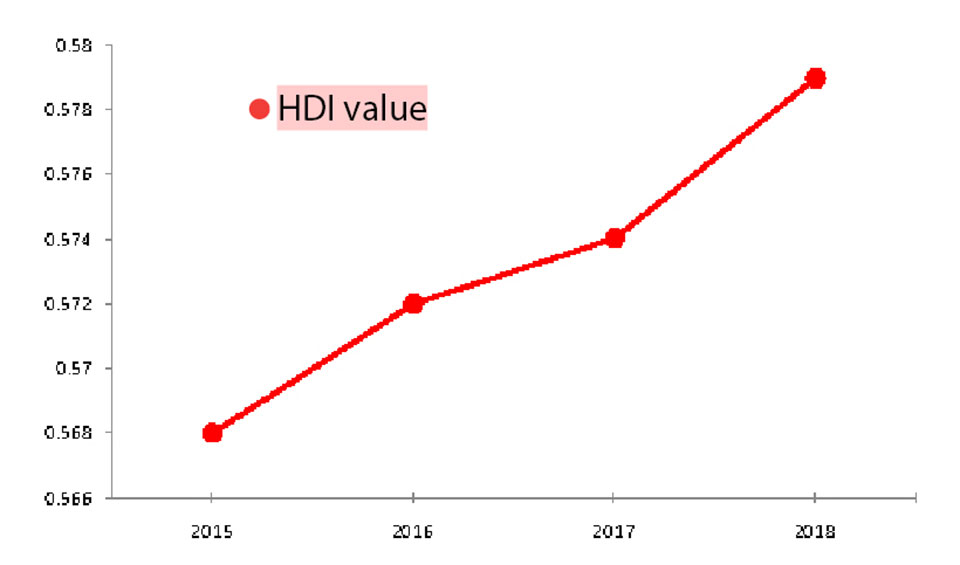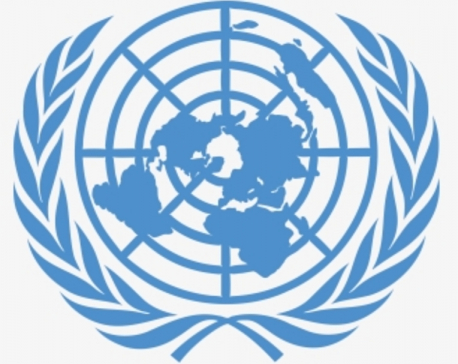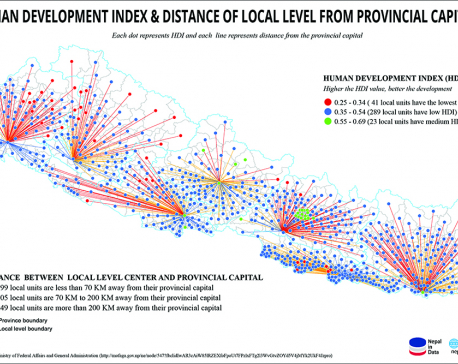
OR
Nepal inches up one spot in HDI ranking
Published On: December 11, 2019 11:46 AM NPT By: Republica | @RepublicaNepal

KATHMANDU, Dec 11: Nepal inched up to 147th position in human development index (HDI) in 2018, up from 148th in 2017, showing the slow progress in human development front.
The Human Development Report unveiled by the United Nations Development Programme (UNDP) in Kathmandu on Tuesday revealed that the country's status in human development almost remained stagnant in 2018. The country's HDI stands at 0.579, only 0.005 points more than the index of 2017.
The HDI is the comprehensive measures of human development. It takes into account three dimensions of human development that include a long and healthy life, access to knowledge, and a decent standard of living.
Health status is measured by life expectancy, and the access to knowledge is measured by expected years of schooling and mean years of schooling.
Similarly, gross national income (GNI) per capita in purchasing power parity of 2011 is the indicator to measure the standard of living.
The latest report shows that Nepal has just maintained its position in the Medium Human Development with the threshold of 0.55-0.69 points. Among SAARC nations, Nepal is ahead of only Pakistan and Afghanistan. Nepal's HDI is also far below the average index of 0.642 for South Asian countries that includes the SAARC member countries and Islamic Republic of Iran.
Nepal succeeded in raising its GNI per capita by US$ 109 to $2,748 during 2018.
However, there was nominal progress in terms of life expectancy and education indicators, according to the report.
The gender inequality index of Nepal is 0.476 which reveals that there is still a huge gap between the HDI for men and women in the country. The HDI for men is 0.612 while that for women is 0.549.
The report has also pointed out that prevailing inequality is threatening human development. “The gap in basic living standards is narrowing for millions of people. However, inequalities surrounding education, and around technology and climate change, have sparked demonstrations across the globe,” reads the report.
Speaking at the report launching event, Minister for Finance Yuba Raj Khatiwada stressed the need for political, social and economic transformation for reducing existing inequality. “Institutional reforms in these areas are the foremost requirement that can help minimize the gap at various levels,” he added.
Khatiwada also expressed dissatisfaction with the developed nations for not providing the pledged financial assistance to underdeveloped countries which, in his view, could also help reduce the inequality. “In addition, there is a need for restructuring in global institutions and global policy making to reduce the gap among the countries,” he added.
Speaking at the event, Dagny Mjos, deputy head of mission at Royal Norwegian Embassy, Kathmandu, said Norway was able to reduce inequality through implementation of broad-based taxation system, tax incentive to the needy sector and maximization in woman participation.
Similarly, Sri Lankan Ambassador to Nepal, Himalee Subhashini, said that Sri Lanka was able to reduce inequality through huge investment in health and education services for a long time period.
Norway, with HDI of 0.990, stands at first position, while Sri Lanka is ranked 71st among 189 countries.
You May Like This

Nepal records HDI of 0.601, an improvement of 0.010 points in past two years
KATHMANDU, March 15: Nepal’s Human Development Index (HDI) stood at 0.601 in 2023, an addition of 0.010 points to its... Read More...

Daughter security becoming effective
JUMLA, Jan 12: The daughter security program is proving to become effective and fruitful. The initiative has been launched by the... Read More...

Infogaphics: Human development index and distance of local level from provincial capital
Human development index and distance of local level from provincial capital ... Read More...







Just In
- Health ministry to conduct ‘search and vaccinate’ campaign on May 13
- Indian customs releases trucks carrying Nepali tea, halted across Kakarbhitta
- Silent period for by-election to begin from midnight
- SC issues short-term interim order to govt and TU not to take immediate action against TU legal advisor Khanal
- National consultation workshop advocates to scale up nutrition smart community in Nepal
- Patan High Court issues short-term interim order to halt selection process of NTB’s CEO
- NEPSE inches up 0.15 points; daily turnover increases to Rs 2.53 billion
- Bagmati Govt mandates tri-lingual signboards in offices











Leave A Comment